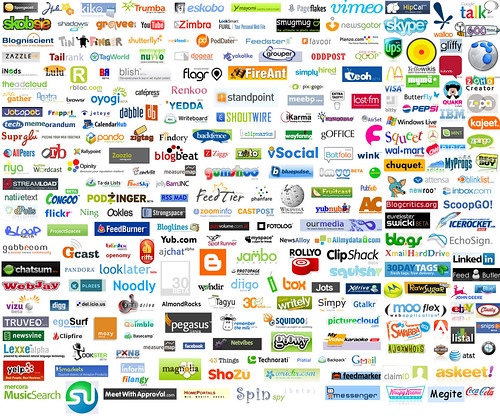by Dana Lawit
 Live from the the Whitestone bridge this post comes to you as I sit on a bus to Boston which has wireless internet. I'm able to use my 4-5 hour journey to follow up on email, do some planning, and figure out how I'm going to get from the train station to where I'll be staying. 5 years ago I sat on the bus to Boston with different tools. book and an iPod to keep me company. In just a few short years it is clear, the world is changing.
Live from the the Whitestone bridge this post comes to you as I sit on a bus to Boston which has wireless internet. I'm able to use my 4-5 hour journey to follow up on email, do some planning, and figure out how I'm going to get from the train station to where I'll be staying. 5 years ago I sat on the bus to Boston with different tools. book and an iPod to keep me company. In just a few short years it is clear, the world is changing.Today, employers expect their employees not only can use Microsoft Office, but many Web 2.0 applications that connect and support collaboration. Students gain most of their information instantly from laptops. In our personal lives, we tag ashare photos with our grandparents on Facebook and track down friends from elementary school that we haven't spoken to in years. Technology is enabling us to curate our public and private lives.
 The world is changing is nothing new, but I suspect that the rate of change is accelerating. This is problematic for those of us working in schools. On my bus ride 5 years ago, I never would have speculated that today I would be able to writing this blog post. And even now I'm behind the times, I'm writing from my clumsy PowerBook; I don't even have a SmartPhone. Which makes me wonder:
The world is changing is nothing new, but I suspect that the rate of change is accelerating. This is problematic for those of us working in schools. On my bus ride 5 years ago, I never would have speculated that today I would be able to writing this blog post. And even now I'm behind the times, I'm writing from my clumsy PowerBook; I don't even have a SmartPhone. Which makes me wonder:How do we prepare our students for an ever-changing world?
In trying to answer this question, I came upon Project New Media Literacies, a research initiative out of MIT's Comparative Media Studies program. The project's white paper outlines new essential skills:
- Play— the capacity to experiment with one’s surroundings as a form of problem-solving
- Performance— the ability to adopt alternative identities for the purpose of improvisation and discovery
- Simulation— the ability to interpret and construct dynamic models of real-world processes
- Appropriation— the ability to meaningfully sample and remix media content
- Multitasking— the ability to scan one’s environment and shift focus as needed to salient details.
- Distributed Cognition— the ability to interact meaningfully with tools that expand mental capacities
- Collective Intelligence— the ability to pool knowledge and compare notes with others toward a common goal Judgment— the ability to evaluate the reliability and credibility of different information sources
- Transmedia Navigation— the ability to follow the flow of stories and information across multiple modalities
- Networking— the ability to search for,synthesize, and disseminate information
- Negotiation— the ability to travel across diverse communities,discerning and respecting multiple perspectives, and grasping and following alternative norms.
Of these skills, what is new? And what is missing? These skills echo Bloom's Taxonomy (introduced in the 1950s) higher order thinking skills of evaluating and creating. Following the 1983 release of A Nation At Risk: The Imperiative for Educational Reform, schools were called upon to focus on "critical thinking" to better prepare students for a new and changing workplace. So perhaps the skills themselves aren't as novel as the setting in which we ask ourselves and our students to apply them.
So then what is missing? If one of the functions of education is to prepare citizens to contribute to the communities in which they reside, then how are we to prepare netizens? Beyond skills, what are the values and understandings students need to contribute to the virtual communities in which they thrive? Here's my tentative list:
 equity- we must expect and demand equal access to information and technology
equity- we must expect and demand equal access to information and technology- creativity- individuals must be driven to find solutions and ways of expression despite limitations
- responsibility - we are connected to our natural and virtual surroundings and the other individuals who populate them
So how will all of this inform my practice? This year I plan to do the following:
- have conversations with my colleagues and students about how they use technology. What uses enhance our life? --stronger collaboration and sharing of information, connecting with friends. What uses cause stress and potential threats?-- my relationship with our school's photocopier, online safety, privacy and the security of information.
- make stuff. And help others do so as well. Technology clearly has the potential to engage kids. Armed with a flip video camera, digital voice recorders, I plan to capture some of the great moments of learning--recording a student performance, creating video art, documenting field work...
- make time for play. Show students enriching and engaging ways to use the internet (Pandora and GrooveShark instantly come to mind). I plan to find time during advisory to talk to kids about multitasking and using the web to work faster and smarter. They'll need to experiment and play.
- reflect and connect. I will be writing about many of these initiatives on this blog, hopefully you will continue to share yours
You have read this article with the title School Starts Next Week--Time to Get Real About Innovation. You can bookmark this page URL http://machining33.blogspot.com/2009/09/school-starts-next-week-time-to-get.html. Thanks!



No comment for "School Starts Next Week--Time to Get Real About Innovation"
Post a Comment